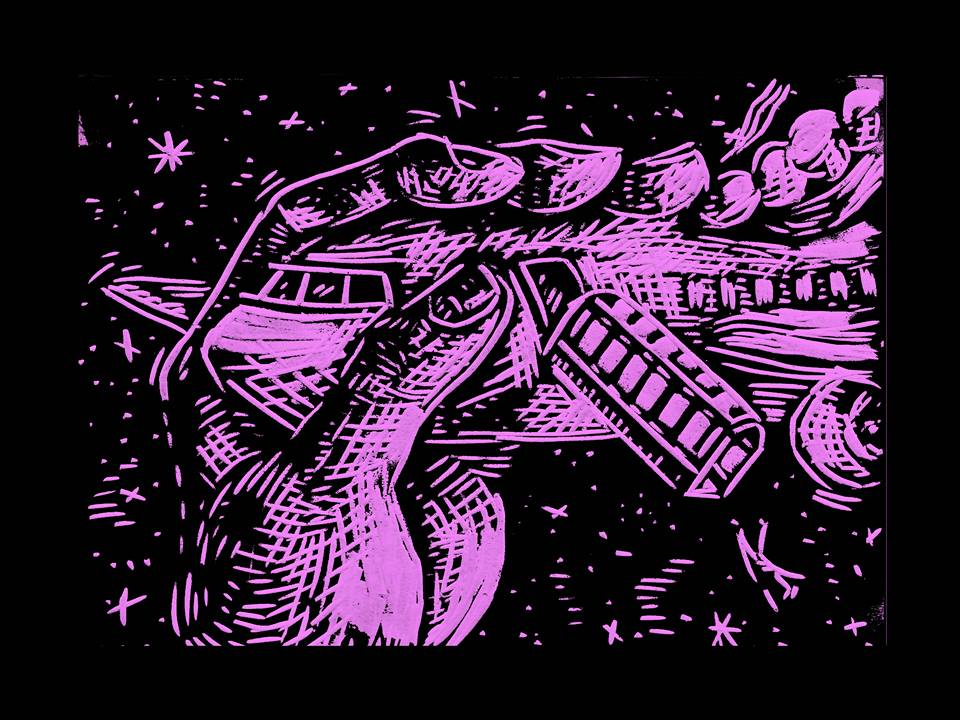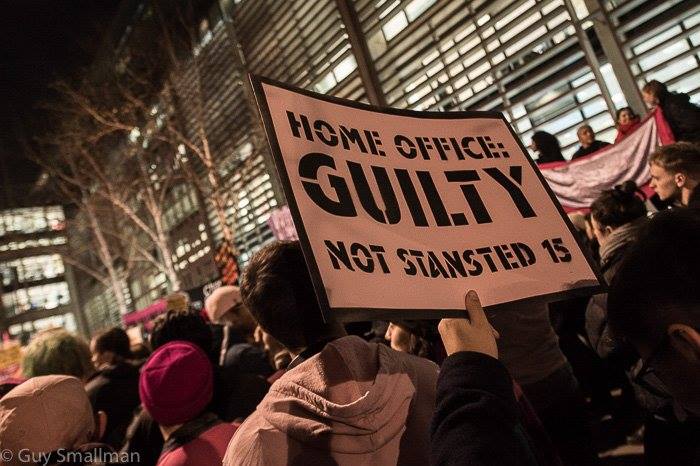The shocking public murder of George Floyd, by a white police officer in the US has sparked worldwide protests. Institutions have been quick to issue statements of support with Black Lives Matter. But racism is pervasive, much of it is normalised. One form of legalised racism enthusiastically pursued by our government is the hostile environment. This limits access to work, housing, public services, healthcare, bank accounts and more. It makes borders a part of everyday life and enlists citizens and private entities to act as border police. As the the UN Special Rapporteur on Racial Equality noted (2019 report on the UK) the policy is hostile to all racial and ethnic minorities because race and ethnicity are used as a proxy for immigration status.
One of the most brutal aspects of the hostile environment is charter flights. These mass deportations are secretive and devoid of scrutiny, departing from undisclosed locations in the middle of the night. Violent restraint methods used during deportations led to the death of Jimmy Mubenga in 2010. Shackles, leg and waist restraint belts are commonly used. This is not OK. The physical and mental violence people are subjected to in detention and during deportations has been exposed through the tireless campaigning efforts, countless documentaries, media stories, legal cases, and civil society reports. Despite the Law Society’s statement in support of Black Lives Matter, and its mandate to safeguard rule of law, the Law Society has not denounced the government’s hostile environment or the State abuse inflicted on some of the most vulnerable people in detention and during deportations. Why won’t the Law Society speak truth to power?
To fill seats on charter planes, people are rounded up based on their perceived nationality and detained before being forcibly removed, in some cases to a country they have never visited. There is little advance notice – which can mean detainees have just a few days to fight for their right to stay in the UK. ‘Reserve’ deportees are also taken to the airport to fill up the places of individuals whose lawyers are successful in making last minute challenges, a practice detainees have described as a form of torture.
Against this background of official racism and violence, in March 2017 I was part of a non-violent protest that blocked embarkation of a charter plane destined for Nigeria and Ghana, at Stansted Airport. We knew the stories about some of the people being deported having read testimonials on the blog Detained Voices. These included a lesbian woman terrified of being forcibly deported to Nigeria, a country which has some of the most repressive laws against LGBTQ+ people in the world, and where her husband who she states she’d been forced to marry, was waiting to kill her. Another young man spoke of his anguish at being separated from his British parents and his fear of Nigeria where members of his family had been killed. A third man had been in the UK nearly 18 years. He had a wife in the UK and nothing in Ghana. He said he would kill himself if he was deported.
We know a number of people have now succeeded in their asylum and human rights claims, including a dad who was reunited with his family and able to be present at the birth of his child. Others who would have been wrongfully deported include trafficking survivors. This included a disabled woman who had been put in a waist restraint belt and ‘dragged like a goat’ by Home Office contractors. In total 11 of the 60 people due to be deported that night remain in the country. Many more might also remain but for the fact that the Home Office rushed to deport as many as possible the following day.
 Our group, ‘Stansted 15’, found that the ‘hostile environment’ is also hostile to those who stand in the way of brutal deportations. We were convicted of endangering the safe operation of an aerodrome by means of a weapon, device or substance under section 1 Aviation & Maritime Security Act 1990, a charge never before used against protesters. The judge refused a defence application for disclosure of the Attorney General’s reasoning in consenting to the unprecedented prosecution. Unlike the original aggravated trespass charge, which carries a maximum sentence of three months, endangering an aerodrome carries a maximum sentence of life imprisonment. The prosecution were unable to identify any threat to the airport or staff. They relied on theoretical risks, such as diverting police resources from the airport terminal building, which they claimed, increased the risk from a terrorist attack, had one occurred coincidentally at the same time. The judge instructed the jury to disregard all the evidence they heard from defendants regarding our motivations for taking action and the threat to people’s lives in deporting them.
Our group, ‘Stansted 15’, found that the ‘hostile environment’ is also hostile to those who stand in the way of brutal deportations. We were convicted of endangering the safe operation of an aerodrome by means of a weapon, device or substance under section 1 Aviation & Maritime Security Act 1990, a charge never before used against protesters. The judge refused a defence application for disclosure of the Attorney General’s reasoning in consenting to the unprecedented prosecution. Unlike the original aggravated trespass charge, which carries a maximum sentence of three months, endangering an aerodrome carries a maximum sentence of life imprisonment. The prosecution were unable to identify any threat to the airport or staff. They relied on theoretical risks, such as diverting police resources from the airport terminal building, which they claimed, increased the risk from a terrorist attack, had one occurred coincidentally at the same time. The judge instructed the jury to disregard all the evidence they heard from defendants regarding our motivations for taking action and the threat to people’s lives in deporting them.
Deportations now also take place from military airports. An investigation by the Morning Star revealed that the Royal Air Force classed the Stansted 15 (and any person or group that deliberately attempts to stop or disrupt a deportation) as an ‘enemy force’. This Government is becoming increasingly authoritarian. The Stansted 15 are appealing the convictions.
History shows law and justice are aligned only after struggle. Disciplinary or criminal action is rare in the cases of abuse by the Home Office and their contractors. Although the Stansted 15 were recognised as human rights defenders by Amnesty International, the Solicitors Regulation Authority opened an investigation against me alleging that by my conviction I failed to demonstrate integrity and failed to maintain standards expected of solicitors. As with the criminal trial, the SRA believes that motive is irrelevant. For nearly 18 months I have been subject to an ongoing investigation, paused pending the outcome of the criminal appeal. To truly stand with the oppressed invites treatment that is a flavour of what the oppressed experience.
The hostile environment is but one racist feature of life in the UK. Many big brands have made statements in support of Black Lives Matter. But as Malcolm X said, you can’t have capitalism without racism. According to the UN, over 40 million people (approximately one in 200) are currently enslaved. The vast majority are people of colour. They are hidden in complex supply chains but they play a key role in manufacturing the stuff we consume. The UN has warned that this figure is only likely to increase as the climate crisis deepens, people migrate and automation displaces jobs.
Our legal system is not serving us, it is the servant of an unjust economic system which oppresses people of colour and is now an existential threat to life itself, driving the climate and ecological crisis. Lawyers urgently need to get behind systems of governance that heal the planet and ensure our collective liberation.







